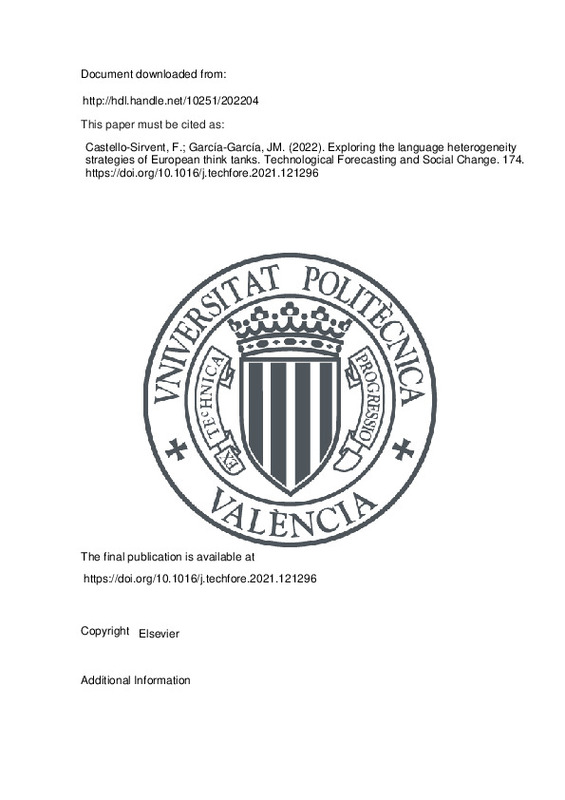JavaScript is disabled for your browser. Some features of this site may not work without it.
Buscar en RiuNet
Listar
Mi cuenta
Estadísticas
Ayuda RiuNet
Admin. UPV
Exploring the language heterogeneity strategies of European think tanks
Mostrar el registro sencillo del ítem
Ficheros en el ítem
| dc.contributor.author | Castello-Sirvent, Fernando
|
es_ES |
| dc.contributor.author | García-García, Juan Manuel
|
es_ES |
| dc.date.accessioned | 2024-01-29T19:01:02Z | |
| dc.date.available | 2024-01-29T19:01:02Z | |
| dc.date.issued | 2022-01 | es_ES |
| dc.identifier.issn | 0040-1625 | es_ES |
| dc.identifier.uri | http://hdl.handle.net/10251/202204 | |
| dc.description.abstract | [EN] This article explores the communication strategies of the main European think tanks who specialise in international economic policy through a study of their linguistic heterogeneity. For this purpose, a fuzzy-set qualitative comparative analysis (fsQCA) is carried out of 19 European think tanks included in the 2018 Global Go To Think Tank Index Report, an annual ranking produced by the University of Pennsylvania since 2008. The studied result is the number of languages in which the think tanks analysed, which was published in the press worldwide from 2009 to 2018. The information was obtained from the Factiva® database, owned by Dow Jones & Company©, which provides access to more than 33,000 news sources from over 200 countries in 27 languages. The results suggested no necessary conditions for a think tank to articulate its communication strategy, regardless of its level of language heterogeneity. However, the sufficiency analysis showed different causal configurations employed by think tanks in designing their strategies. The evidence shows a wide dispersion of the number of news items, the years of experience of the think tanks and the number of languages employed in their communication strategies from 2009 to 2018. | es_ES |
| dc.description.sponsorship | This study was supported by ESIC Business & Marketing School under Project Grant 1-V-2021 and is part of the SEDDeS Research Group (Society, Digital Economy and Sustainable Development). | es_ES |
| dc.language | Inglés | es_ES |
| dc.publisher | Elsevier | es_ES |
| dc.relation.ispartof | Technological Forecasting and Social Change | es_ES |
| dc.rights | Reconocimiento - No comercial - Sin obra derivada (by-nc-nd) | es_ES |
| dc.subject | Think Tanks | es_ES |
| dc.subject | Internacionalization | es_ES |
| dc.subject | International marketing | es_ES |
| dc.subject.classification | ORGANIZACION DE EMPRESAS | es_ES |
| dc.subject.classification | ECONOMIA, SOCIOLOGIA Y POLITICA AGRARIA | es_ES |
| dc.title | Exploring the language heterogeneity strategies of European think tanks | es_ES |
| dc.type | Artículo | es_ES |
| dc.identifier.doi | 10.1016/j.techfore.2021.121296 | es_ES |
| dc.relation.projectID | info:eu-repo/grantAgreement/ESIC Business & Marketing School //1-V-2021/ | es_ES |
| dc.rights.accessRights | Abierto | es_ES |
| dc.contributor.affiliation | Universitat Politècnica de València. Escuela Técnica Superior de Ingenieros Industriales - Escola Tècnica Superior d'Enginyers Industrials | es_ES |
| dc.contributor.affiliation | Universitat Politècnica de València. Escuela Técnica Superior de Ingeniería Agronómica y del Medio Natural - Escola Tècnica Superior d'Enginyeria Agronòmica i del Medi Natural | es_ES |
| dc.description.bibliographicCitation | Castello-Sirvent, F.; García-García, JM. (2022). Exploring the language heterogeneity strategies of European think tanks. Technological Forecasting and Social Change. 174. https://doi.org/10.1016/j.techfore.2021.121296 | es_ES |
| dc.description.accrualMethod | S | es_ES |
| dc.relation.publisherversion | https://doi.org/10.1016/j.techfore.2021.121296 | es_ES |
| dc.type.version | info:eu-repo/semantics/publishedVersion | es_ES |
| dc.description.volume | 174 | es_ES |
| dc.relation.pasarela | S\468127 | es_ES |
| dc.contributor.funder | ESIC Business & Marketing School | es_ES |







![[Cerrado]](/themes/UPV/images/candado.png)

